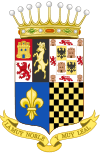Chinchón
| Chinchón | |||
|---|---|---|---|
| Municipality | |||
| |||
 Chinchón Location in Spain | |||
| Coordinates: 40°8′22″N 3°25′35″W / 40.13944°N 3.42639°WCoordinates: 40°8′22″N 3°25′35″W / 40.13944°N 3.42639°W | |||
| Country |
| ||
| Autonomous community |
| ||
| Province | Madrid | ||
| Area | |||
| • Total | 115.9 km2 (44.7 sq mi) | ||
| Elevation | 753 m (2,470 ft) | ||
| Population (2008) | |||
| • Total | 5,191 | ||
| • Density | 45/km2 (120/sq mi) | ||
| Demonym(s) | Chinchonete /-a | ||
| Time zone | CET (UTC+1) | ||
| • Summer (DST) | CEST (UTC+2) | ||
| Postal code | 28370 | ||
| Website | Official website | ||
Chinchón (Spanish pronunciation: [tʃinˈtʃon]) is a Spanish town and municipality 50 km southeast of Madrid in the autonomous Community of Madrid. It is part of the Comarca de Las Vegas. The population was 5,447 in 2014.
Tourism
The Plaza Mayor is roughly circular, surrounded by 15th-17th century galleried houses and cafés. The church of Nuestra Señora de la Asunción was built in the 15th and 16th centuries. It contains a fine early work by Goya depicting the Assumption of the Virgin.
There is also a medieval castle, which, however, is somewhat damaged and also closed to the public. Its last actual use was as a distillery producing Anís de Chinchón known commercially as Anisette, an anise-flavored high-alcohol liqueur which the town is noted for.
Though small, Chinchón is known for its festivals, a big draw for people from nearby Madrid, and those visiting it. Two of the biggest are the Chinchón Festival de anis y vino, a celebration of locally distilled anisette and wine, which takes place at the end of March, and the October garlic festival. In October of each year the central plaza is the site of a temporary bullring, with the profits from the bullfighting going to charitable causes.
History
The plain of Tajuña has long been inhabited. Neolithic remains have been found next to the site of an Iberian or Celtiberian village.
Roman roads and an irrigation system indicate later settlement. In the Tajuña Muslim influence, then Christians would consolidate this work. The Christians regained control over the area when Alfonso VI of Castilla took Toledo in 1085. In 1480, it became a dominion granted to the Marquis de Moya.

In film
In Around the World in Eighty Days, the main square of Chinchón and most of the population were employed for the filming of a bullfight featuring Cantinflas.
The 1987 sci-fi movie The Falling is set in Chinchón.
See also
External links
- Chinchon visitor information English
- Chinchon Official Tourism Site English
- Chinchon Official Regional Tourism Site Spanish
- Photos Chinchon Spanish

